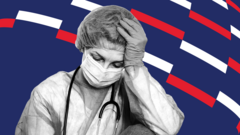As Australia approaches its upcoming election, a national crisis looms over the country's healthcare system, marked by staffing shortages, escalating costs, and dwindling access to vital services. Experts warn that the current proposals for reform may only provide temporary relief without addressing the fundamental issues plaguing the system.
The Australian Healthcare Crisis: A Race Against Time for Universal Care

The Australian Healthcare Crisis: A Race Against Time for Universal Care
With Australia's universal healthcare system faltering, the urgent need for reform is evident as patients struggle to access basic medical services.
In the scenic coastal town of Streaky Bay, South Australia, Dr. Victoria Bradley finds her idyllic surroundings overshadowed by a healthcare crisis. Once proud of her picturesque practice, Dr. Bradley now grapples with the challenges of being the sole permanent doctor in a community of about 3,000 residents. Her experiences highlight a growing national issue: Australia's universal healthcare system is facing unprecedented strain, with critical worker shortages and escalating wait times impacting patient care.
The dilemma came to a head when Dr. Bradley, overwhelmed by 24/7 demands and burnout, decided to quit two years ago, leading to the unraveling of the local healthcare framework. This situation reflects a broader crisis across Australia, where inadequate funding and increasing costs are forcing people to postpone or forgo necessary medical attention. As the election approaches on May 3, healthcare has emerged as a pivotal topic, prompting major parties to pledge billions in additional funding. However, many experts argue that these proposals fall short of addressing structural failings and that more comprehensive reforms are critical for the future of the system.
Renee Elliott, a Streaky Bay resident, illustrates the individual toll of healthcare shortcomings. After discovering cancerous lumps in her breast, Elliott found access to specialized care challenging, often traveling 500 kilometers to Adelaide, incurring significant costs amidst other familial responsibilities. The establishment of Medicare, with its aim to guarantee accessible healthcare, now stands at risk, as funding issues disrupt service delivery and contribute to a widening gap between urban and rural patients.
Recent data indicates that nearly one-third of patients now face out-of-pocket expenses for GP visits, a trend exacerbated by a growing number of providers unwilling to bulk-bill due to insufficient reimbursement from the government. Young Australians like electrician Callum Bailey express frustrations over the affordability of medical care, echoing sentiments of many who hesitate to seek help for health issues due to cost barriers.
The impending election has fueled discussions about the health system, prompting voices like those of health economists and advocates to stress that mere funding increases are inadequate. Proposed changes, including additional subsidies and enhanced training, are being met with skepticism. Experts argue for a complete overhaul of the way healthcare is financed and administered, including a transition to a model more focused on patient population needs rather than a per-appointment payment basis.
As the healthcare system teeters on the brink, the repercussions are felt most acutely in rural areas such as Streaky Bay. Local initiatives have emerged to address these gaps, yet the community remains burdened with the costs of accessing what was once a public right. Calls for equitable service rather than premium care are at the forefront of discussions, as residents question whether universal healthcare, as envisioned, can survive amidst the current turmoil.
In conclusion, while promises from political leaders pave the way for potential recovery, many Australians remain doubtful that these measures will suffice to restore the integrity of their healthcare system. With critical reforms urgently needed, the next steps taken by the government in addressing these challenges will determine if Australia's universal healthcare can be preserved or if it will fall into irretrievable disarray.



















